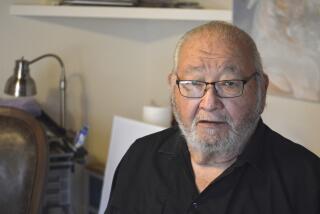Wright Morris; American Gothic Novelist and Essayist
MILL VALLEY, Calif. — Wright Morris, the American Gothic novelist and essayist who wrote about his native Nebraska and was often called one of the nation’s most popular unrecognized writers, has died at the age of 88.
Drawing on his childhood and comic overseas misadventures, Morris, who died Saturday in this community just north of San Francisco, wrote 33 books. They included 19 novels, three memoirs, four books of essays, two collections of short stories and five books of annotated photographs.
“No book of mine can be read under a hair dryer, while bolting a hamburger or half-watching TV,” he said in 1963, acknowledging his reputation as a sophisticated writer on unsophisticated subjects.
But he seemed to shrug off any disappointment over his reception.
“Everything is not for everybody,” he said, confessing, “I find it harder to account for readers I have than for those I don’t.”
With his bushy white hair and bristling mustache, Morris was a familiar figure in book columns, in literary forums through the mid-1980s and at San Francisco State, where he taught from 1963 to 1974. Morris also taught at USC in the summer session of 1958, shortly after winning the National Book Award for fiction for his Mexican bullfighting epic, “The Field of Vision.”
His last book, “Collected Stories: 1948-1986,” was published in 1986 by Harper & Row.
Those 25 stories, according to a Times book reviewer in 1986, afforded “a startling chronological retrospective of his fictional preoccupations during the last 40 years.” The reviewer rated Morris’ earliest works “somewhat clumsy and uninviting” and said the author “insists on crushing the reader under the weight of life’s ugliness.”
“With time, however, Morris’ solemnity gives way to a more retrospective, more accepting (if not forgiving) tone,” the reviewer continued. “The best stories are the last ones, as Morris adds texture to his sensibility, tenderness to his metaphors.”
Morris’ first novel, the semiautobiographical “My Uncle Dudley,” was published in 1942. One of his most acclaimed books was “Solo: An American Dreamer in Europe” in 1983, telling the story of his prewar jaunt through Europe, where he was imprisoned in an Austrian castle and arrested in Italy by Mussolini’s palace guard.
Morris was born in 1910 in Central City, Neb., where he would set many of his stories. As a youth, he bummed around the Midwest and made his way to California, where he dabbled in writing before dropping out of college to roam Europe.
Returning to the United States before World War II, he imitated his idol Walker Evans by crisscrossing the country taking photographs of a vanishing America.
In 1934 he married a fellow student. They later divorced, and he married Josephine Mary Rossler, an art collector and dealer, in 1961. She is his only survivor.
In 1970 he was voted into the National Institute of Arts and Letters, the congressional honor society. In 1981 he won an American Book Award for another novel, “Plains Song,” and earned the Los Angeles Times’ Robert Kirsch Award for his body of work. In 1985 he was among the first recipients of the Whiting Writers Awards. He also won three grants from the Guggenheim Memorial Foundation.
More to Read
Sign up for our Book Club newsletter
Get the latest news, events and more from the Los Angeles Times Book Club, and help us get L.A. reading and talking.
You may occasionally receive promotional content from the Los Angeles Times.








